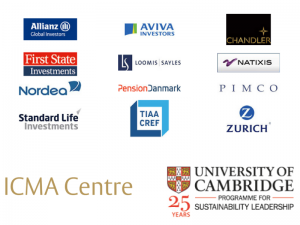New project with Cambridge and 12 global asset managers to advance value of sustainable investing
Dr Andreas Hoepner, Associate Professor of Finance and Rupini Rajagopalan, PhD student, both from the ICMA centre, Henley Business School have been recently working together with the University of Cambridge Programme for Sustainability Leadership (CPSL) on a new project to advance the value of sustainable investing.
This project joins forces with a group of leading asset managers and owners called the Investment Leaders Group (ILG). The ILG members consists of Allianz Global Investors, Aviva Investors, Chandler Corporation, First State Investments, Loomis Sayles, Natixis Asset Management, Nordea Life & Pensions, PensionDanmark, PIMCO, Standard Life Investments, TIAA-CREF Asset Management and Zurich Insurance Group.
Dr Hoepner who is also a Senior Associate to the CPSL and Ms Rajagopalan have been working with the ILG members on the first prologue project which will concentrate on developing an understanding of the current state of practice in sustainable investment.

